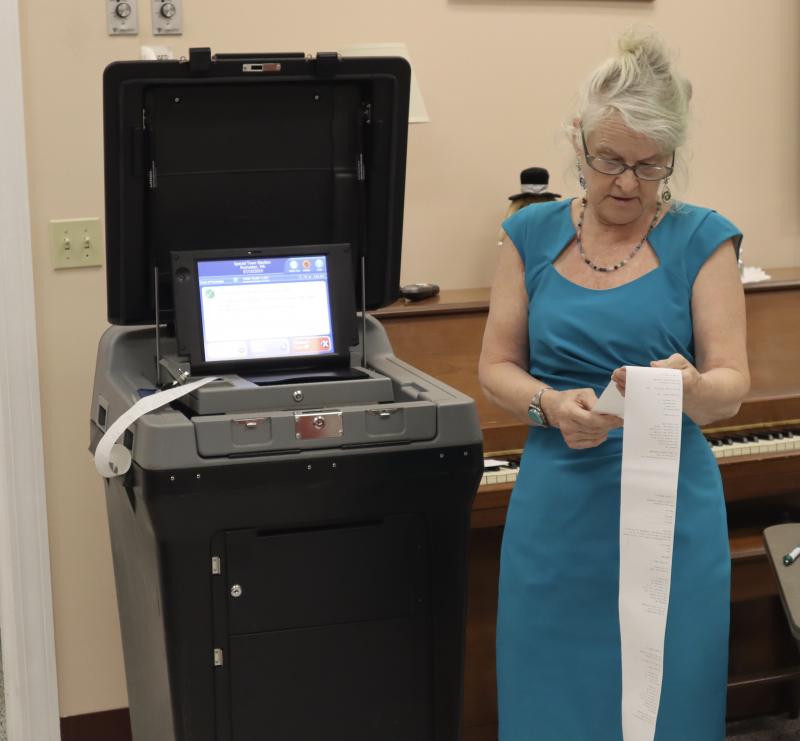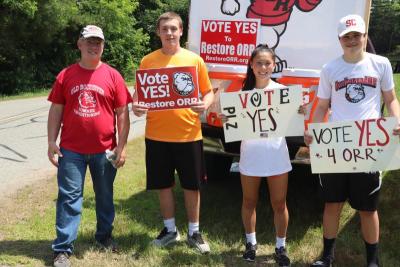Rochester votes ‘no’ on ORR restoration project
ROCHESTER — A $2 million restoration project at Old Rochester Regional (ORR) High School failed to pass a special election in Rochester on Wednesday, July 10 with a final count of 689 “no” votes and 575 “yes” votes. Of the 4,280 active registered voters in Rochester, 1,265 voted.
The project would have included a new turf athletic field, a resurfaced track, and LED auditorium lights and new sound system wiring.
An affirmative vote would have allowed all three towns to tax over the proposition 2-1/2 limit, which restricts tax rates increases to 2.5 percent, for fifteen years, until money borrowed for the project was repaid.
Advocates for the project calculated that based on average house costs, residents in Rochester would have paid an additional $34.39 in taxes during the first year of the project. In Marion that tax increase would amount to $25.11, and $19.57 in Mattapoisett.
The fields at the school have not been renovated since 2000, and advocates for the project expressed safety concerns for athletes who play on the fields due to their poor condition.
The non-profit group Tri-town Unified Recreational Facilities (T.U.R.F.) first formed in 2015 to address athletic facilities at ORR. T.U.R.F began fundraising efforts, and hired athletic facility design firm Kaestle Boos Associates to work on plans for new facilities. The group presented an initial plan to both school and town administrators in the spring of 2018. The original plan would have cost $5 million and included a concession stand, but feedback on the plan indicated that it likely would not pass because of the cost.
So the group worked to scale down the plan, in an effort to get it to pass. In January 2019 the revised $2 million plan, focusing on the areas most in need, was presented to the school committee by the facilities subcommittee, which served as a liaison.
All three towns approved the revised project at their spring Town Meetings, and Marion and Mattapoisett went on to approve the project in their annual town elections in May 2019. The special election in Rochester was the last step in approving the restoration project. The project had to pass all steps of the process to begin construction.
School Committee member Tina Rood waited at the polls to hear the results of the election. Despite being disappointed in the result she said “we will still need to address the safety concerns of our facility for our students, and we will continue to work towards this goal.”
At a Mattapoisett Town Meeting ORR senior and Lacrosse Captain Gates Tenerowicz said that she witnessed an opposing player roll her ankle while walking on the field, and that one of her teammates slipped and tore her ACL. Auditorium lights are also in bad condition, putting students at risk of burns. A third of the lights do not function.
Hal Rood has worked as a volunteer for the project for three of its four years and also expressed disappointment in the results. “It’s disappointing to see how the Rochester people have voted. They have spoken, They have said the $35 per year is too much for a project that will not only in the short-term improve dangerous conditions but set us on a path to generate revenue,” he said.
ORR student Rachael Fantoni gathered with other project advocates form the school outside on Dexter Lane with signs in favor of a “yes” vote. She said she believed the renovations would have benefited the community as a whole, and not just the high school. She added that the fields could also have been used by youth sports programs in addition to ORR teams.
Mattapoisett Finance Committee Chair Pat Donoghue expressed concerns with the project prior to the election. Based on her research she said the turf field would last 10 to 12 years at best, and the manufacturer guaranteed it for 8 years. She said she would need to see something in writing saying the field would last at least 20 years, to feel comfortable financing it for longer than the proposed 15 years.
Project proponents need to decide how to proceed with their safety concerns, and know that the vote may force the athletic department and school committee into difficult decision.
“The school committee will have to regroup and decide what they do. They know it’s not safe,” Hal Rood said.













